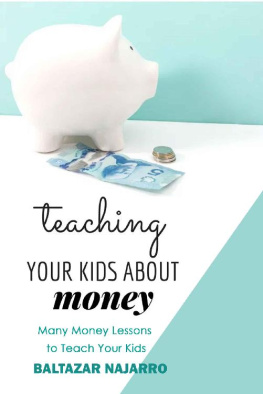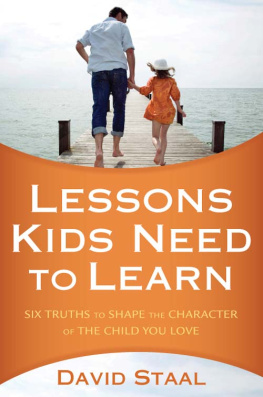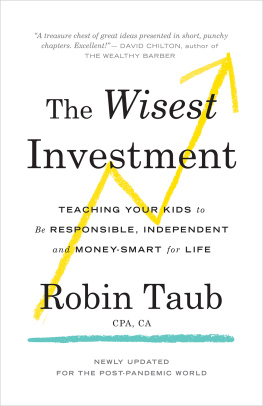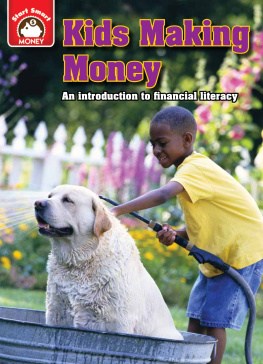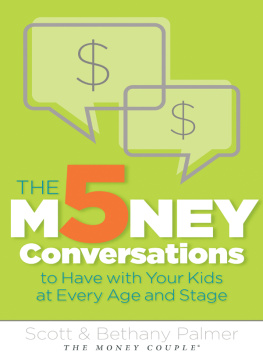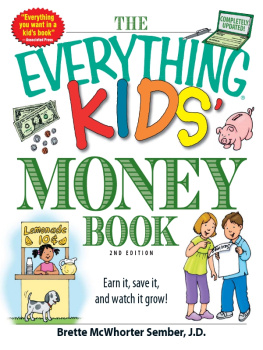Baltazar Najarro - Teaching Your Kids About Money: Many Money Lessons to Teach Your Kids
Here you can read online Baltazar Najarro - Teaching Your Kids About Money: Many Money Lessons to Teach Your Kids full text of the book (entire story) in english for free. Download pdf and epub, get meaning, cover and reviews about this ebook. year: 2020, genre: Children. Description of the work, (preface) as well as reviews are available. Best literature library LitArk.com created for fans of good reading and offers a wide selection of genres:
Romance novel
Science fiction
Adventure
Detective
Science
History
Home and family
Prose
Art
Politics
Computer
Non-fiction
Religion
Business
Children
Humor
Choose a favorite category and find really read worthwhile books. Enjoy immersion in the world of imagination, feel the emotions of the characters or learn something new for yourself, make an fascinating discovery.
- Book:Teaching Your Kids About Money: Many Money Lessons to Teach Your Kids
- Author:
- Genre:
- Year:2020
- Rating:3 / 5
- Favourites:Add to favourites
- Your mark:
- 60
- 1
- 2
- 3
- 4
- 5
Teaching Your Kids About Money: Many Money Lessons to Teach Your Kids: summary, description and annotation
We offer to read an annotation, description, summary or preface (depends on what the author of the book "Teaching Your Kids About Money: Many Money Lessons to Teach Your Kids" wrote himself). If you haven't found the necessary information about the book — write in the comments, we will try to find it.
Baltazar Najarro: author's other books
Who wrote Teaching Your Kids About Money: Many Money Lessons to Teach Your Kids? Find out the surname, the name of the author of the book and a list of all author's works by series.
Teaching Your Kids About Money: Many Money Lessons to Teach Your Kids — read online for free the complete book (whole text) full work
Below is the text of the book, divided by pages. System saving the place of the last page read, allows you to conveniently read the book "Teaching Your Kids About Money: Many Money Lessons to Teach Your Kids" online for free, without having to search again every time where you left off. Put a bookmark, and you can go to the page where you finished reading at any time.
Font size:
Interval:
Bookmark:
Teaching Your Kids About Money
Many Money Lessons to Teach Your Kids
Baltazar Najarro
Copyright 2020 Baltazar Najarro
All rights reserved.
ISBN: 9798654133656
DEDICATION
The author and publisher have provided this e-book to you for your personal use only. You may not make this e-book publicly available in any way. Copyright infringement is against the law. If you believe the copy of this e-book you are reading infringes on the author's copyright, please notify the publisher at: https://us.macmillan.com/piracy
Contents

When is the best time to talk to your kids about money?
Right now.
Your kids will learn about money from someone. Dont let it be from an out-of-control celebrity on social media. You have the opportunity to be the positive example in their lives and the guiding voice they can trust.
No, money isnt a taboo subject, and no, your kids dont need to be sheltered from financial matters. So buckle up and just have the talk alreadyor go deeper if youve only skimmed the surface. If you want to change your family tree, youve got to change your mind-set.
Here are five tips for talking to your kids about money.
1. Start slow.
According to a 2017 T. Rowe Price survey, 69% of parents have some reluctance when it comes to talking about money with their children. And only 23% of kids say they talk with their parents frequently about money. Theres no need to schedule a five-hour lecture presentation to review bank account balances and retirement plan contributions. Start by simply answering your kids money questions at an age-appropriate level.[1]
You may be surprised at what they already know or what they need to know more about.
No more money fights! Get on the same page with your money!
Once they realize youre open to these discussions, they may be more comfortable coming to you with money questions.
2. Be honest.
If you regret going into debt or not saving more for college, tell your kids. Parents so rarely have open, honest moments with their children. Kids can handle itreally.
Instead of hiding your financial failures or covering it up when money is tight, tell your kids the truth. If you ran up debts in your past and had difficulty paying them back, share that. Theyll appreciate your openness and learn a valuable lesson about overspending.
3. Talk values, not figures.
If youre hesitant about disclosing your salary and major expenses to your kids, dont sweat it. The good news is your kids dont really want (or need) to know that stuff. They need concepts like saving, budgeting, paying down debt, and giving.
To help your kids get an idea of what real-world budgeting looks like, encourage them (when age-appropriate) to download the EveryDollar app. They can use the tool to track spending habits and see just how far their money is going. Soon, establishing a budget will feel like second nature. And if they stick with it, theyll be well ahead of the curve by the time they hit the college campus.
4. Set family goals.
Let your children sit in on and contribute to family budget committee meetings. Just remember you and your spouse are the adults. Only mom and dad make the final decisions. If you are paying off debt or saving for the future, let the kids join in as you celebrate reaching milestones along the way.
As you set goals as a family, remind your kids that goals require sacrifice. That might mean skipping a vacation in order to cash-flow a car. But theyll catch onespecially if they understand these sacrifices will affect their future as well.
5. Learn about money together.
Eventually youll touch on topics you may not completely get yourselflike mutual funds, money market accounts or Roth IRAs. If you dont feel fully knowledgeable on these topics, thats okay! Admit you dont have all the answers and do the research together to find ways of securing your future. Its a great excuse to spend some time together!
So go ahead and open up about the family finances, but keep it simple. Start the conversation, be honest, and teach and lead by example. Someday, your money-smart kids will be proud to follow in your big financial footsteps.

IMPARTING IMPORTANT financial lessons, including saving strategies and money-management skills, is crucial to help your children achieve long-term success.
Teaching your child how to save and spend wisely can shape his or her future attitudes toward money. So if you're looking to set your kids up for financial success later in life, here are 17 strategies to consider:
Demonstrate the value of money.
Talk to your kids about money.
Talk about money when or after you watch TV shows.
Pull out the board games.
Let your kids shop.
Stress the importance of curbing impulse purchases.
Start a coin collection.
Discuss big purchases with your kids.
Encourage teens to get jobs and earn money.
Talk about "opportunity cost."
Encourage your kids to give to charity.
Help your children open a bank account.
Show your kids how to map out a budget.
Make saving for something a family project.
Teach kids to use credit cards the right way.
Introduce your kids to basic investing concepts.
Share your past money mistakes.
1. Demonstrate the Value of Money
It's that familiar writer's rule show, don't tell. Because visuals can be a helpful learning tool, some experts suggest that young children use a glass jar instead of a piggy bank, so they can see the money they collect. However, there are other visual teaching tricks you may want to employ.
Michael Tanney, director of the Magnus Financial Group, a financial advisory firm in New York City, suggests showing a child a bucket and putting it in a sink and then filling it up. "The water represents money. Turning the sink handles represents the job, and the bucket represents the bank," he says, explaining that if you spill all the water out of a bucket (or spend all your money, using the metaphor) and have none left, you must go back to the sink and work to earn more water (or money). "A bank account doesn't operate much differently," he says.
2. Talk to Your Kids About Money
Even at a young age, kids should understand how you're getting the services and products you're receiving.
Stefanie Lewis, regional wealth planning manager for Wells Fargo Private Bank in Fort Lauderdale, Florida, points out that children see their parents paying for things in a variety of ways, and it isn't always obvious to them what's going on. "They see us use plastic cards to pay for some things, and coins and green paper for others. We buy lattes with our phones. We pay for gas through some invisible encounter between our wallet and the pump," Lewis says. "How do we expect our kids to understand money in the year (2020)?"
The bottom line: Unless you explain to them how you're paying, kids won't understand how much items and services cost.
3. Talk About Money When or After You Watch TV Shows
If you're binge watching a lot with your kids, you may have noticed that there are a lot of money lessons that you can painlessly teach your children by discussing the financial choices that TV characters make. For instance, people often comment on how unlikely it would be that the young adult characters on "Friends" could have afforded the roomy apartments they lived in.
Font size:
Interval:
Bookmark:
Similar books «Teaching Your Kids About Money: Many Money Lessons to Teach Your Kids»
Look at similar books to Teaching Your Kids About Money: Many Money Lessons to Teach Your Kids. We have selected literature similar in name and meaning in the hope of providing readers with more options to find new, interesting, not yet read works.
Discussion, reviews of the book Teaching Your Kids About Money: Many Money Lessons to Teach Your Kids and just readers' own opinions. Leave your comments, write what you think about the work, its meaning or the main characters. Specify what exactly you liked and what you didn't like, and why you think so.

